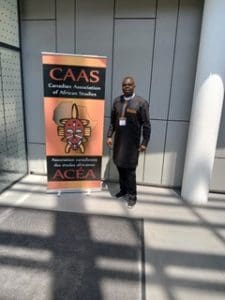A Nigerian Visionary Spreading Peace Beyond Borders. Member Spotlight: Adeolu Ojedokun
“I pull from theory, from practice, and then merge them together to propose a peacebuilding approach in a polarized society.”
 Adeolu Ojedokun blends his accomplished academic background with his on the ground peacebuilding experience to enact real change in his home country of Nigeria and beyond. Growing up in the Yoruba community, the ethnic conflicts Adeolu witnessed never made sense to him. He wondered, “Why are so many conflicts centered in Africa and the Middle East?” Adeolu realized that this issue “required urgent attention” and vowed to uncover its true root causes.
Adeolu Ojedokun blends his accomplished academic background with his on the ground peacebuilding experience to enact real change in his home country of Nigeria and beyond. Growing up in the Yoruba community, the ethnic conflicts Adeolu witnessed never made sense to him. He wondered, “Why are so many conflicts centered in Africa and the Middle East?” Adeolu realized that this issue “required urgent attention” and vowed to uncover its true root causes.
Adeolu worked as a Christian missionary in the Middle East for many years, specializing in the United Arab Emirates. He dedicated his time there to advancing the faith-based organization he founded, called Holy Ghost Palace. The non-profit helps foster peace through inter-faith communication and relationship building. Recognizing that the same denomination can take different forms in different countries, Adeolu also engages in intra-faith peacebuilding. Religion plays a large role in many conflicts, and Adeolu—through Holy Ghost Palace—hopes to emphasize unity in religious communities.
Adeolu then went on to receive two Masters degrees in England, where he studied reconciliation, peacebuilding, and business administration. Currently, Adeolu is pursuing his PhD in International Conflict Management from Kennesaw State University in Georgia. Adeolu betrays no discomfort with managing these major relocations. His ability to navigate the cultural shifts from Nigeria to the UAE, the UK, and now the United States is highly impressive, and not an easy feat. Adeolu recognizes the importance of expanding his worldview and learning all he can from each new environment.
Indeed, Adeolu has become fully immersed in his PhD program. A large component of his peacebuilding theory lies in the human tendency of grouping (such as ethno-religious grouping). He explains how any form of grouping can lead to conflict when there is an unequal distribution of resources. In this way, conflicts stem from many sources, shaped by the intersection of economics and national or global politics. Adeolu approaches these complexities with enthusiasm and confidence.
Adeolu wrote papers entitled “National Dialogue as Peace Praxis: Lessons from Tunisia for Nigeria’s Fragmented Federation” and “From Tension to Tolerance: A Peacebuilding Approach for Yoruba Religious Conflicts in Nigeria.” His PhD thesis will explore how inter-group inequalities—combined with multidimensional poverty and the availability of natural resources—can predict mass atrocities in post-colonial Africa. For example, when colonial powers arrived with force, in some cases, this led to greater unity among the colonized people—regardless of their prior conflicts. This unity, however, was a form of negative peace which often erupted into violence shortly after independence. The Biafra war in Nigeria and the Rawandan genocide are suitable examples. Adeolu stresses that there are benefits and downsides to colonialism, and that these relationships are never as simple as they may seem.

“I ask myself, what was the kind of inequality planted by colonialism which eventually germinated?” Adeolu muses, although he is quick to add that, “We cannot blame colonialism for all of the problems in Africa. If the leaders in Africa had changed up the narrative and done things differently in the post-colonial period, Africa possibly would have been peaceful.”
It is precisely this sharp and honest way of analyzing conflict which makes Adeolu such an impressive academic. He draws from many disciplines, from international relations to negotiation and mediation. And Adeolu is excited to share his ideas even more in the future. He wants to contribute to the body of peacebuilding scholarship in order to inspire others in their efforts.
At MBBI, Adeolu has enjoyed learning from practitioners about how to enhance his own work. He attended the United Nations High Level Political Forum in July 2025 as part of the MBBI delegation to the HLPF. Adeolu also is involved in the Sustainable Development Goals Action Group. He has particular interest in SDG number 17—strengthening global partnerships—since it is particularly close to Adeolu’s personal mission.
MBBI is lucky to have such a peacebuilder in its midst. And, with his international zeal, Adeolu is sure to spread his vision of peace wherever his journey may take him. Drawing on experiences across Africa, the Middle East, Europe, and North America, Adeolu is prepared to channel his wealth of knowledge into initiatives that advance global peace. His vision for a more just and peaceful world will continue to resonate across continents.
Article by Elsie Aleck, MBBI Writer
